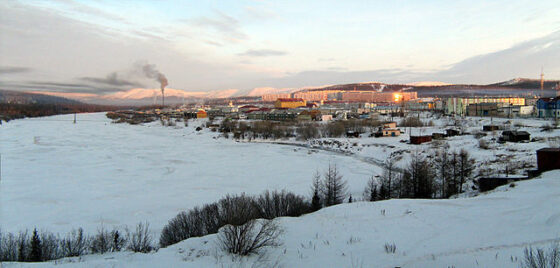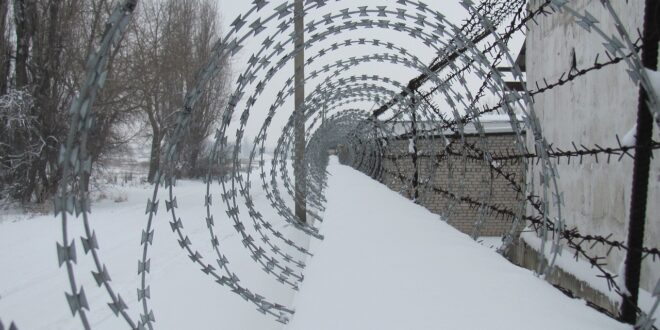“Your body reacts badly to beatings, to rape, to physical torture, extreme cold. They know how to use this.”
by Susan Katz Keating
In winter, the prisoners are forced to stand outside wearing light clothes, and are blasted with a water cannon if anyone moves. In spring, they are half-stripped, and sent into thick swarms of hungry mosquitos. Throughout the year, men are beaten savagely for trumped-up infractions, or are sealed for long periods inside tiny iron boxes. These are among the conditions described by former inmates of Russia’s notorious Arctic prison colonies, where Kremlin critic Alexei Navalny died on Friday under mysterious circumstances.
READ MORE: Moscow Says Alexei Navalny Was ‘Fine’ Before He Died Suddenly in Prison
Navalny had been serving a 19-year prison term on extremism charges that his supporters said were politically motivated. Russian authorities announced on Feb. 16 that the 47-year-old Navalny died after going for a walk inside the “Polar Wolf” prison that officially is called FGU IK-3.
Located north of the Arctic Circle in the Yamalo-Nenets region, Polar Wolf is part of a network of about 700 penal colonies throughout Russia. It belongs to a subset of seven “special regimen” facilities that hold serial killers, rapists, pedophiles, repeat offenders, and political prisoners.
Inmates have reported for years that conditions inside the Polar Wolf colony are brutal even for the Russian prison system.
“They use your body against you in very special ways,” a Russian lawyer told Soldier of Fortune via a secure messaging system. “Your body reacts badly to beatings, to rape, to physical torture, extreme cold. They know how to use this.”
The punishments often are geared toward the season, the lawyer said – a charge that is echoed by others.
“In the winter, prisoners would be hastily assembled in the courtyard in light clothing,” activist Olga Romanova told RFE/RL’s Siberia Realities. “They were held in formation and not allowed to clap or rub their hands together. They had to stand for 30 or 40 minutes without moving when it was minus 45 degrees Celsius or colder. If one person moved, the whole group was doused with water.
“In the spring, there was a new torture,” she said. “Mosquitoes and biting flies. If you moved a hand, the water came. They would just douse the whole group with a water cannon.”
The prison culture is such that guards sometimes collude with inmates to keep both groups out of trouble. If authorities announce an inspection, for instance, the groups collaborate to remove contraband, such as playing cards, from the cells.
“A guard who allows the cards could get a bad punishment,” the lawyer said.
The infractions are permitted because it makes life easier on both groups, the lawyer noted.
“It is a burden to always enforce everything.”
This does not mean that the inmates and guards are friends, the lawyer added, saying that punishment still is meted out “according to policy.”

The policy extends throughout the “Polar” prisons, one former inmate said.
“As soon as you cross the threshold, they let you know that you are in purgatory where you have no rights and there is no one to complain to,” Ukrainian filmmaker Oleh Sentsov told Siberia Realities. Sentsov spent five years on a terrorism conviction at the sister prison K-8 (“Polar Bear”), also in the Yamalo-Nenets region. “Beatings, humiliation, electric shocks, being kept in a cold cell naked or in wet clothes — but that is still not the worst.
“You can be sealed in the fetal position in an iron box where you can hardly breathe and have to urinate on yourself…. They routinely threaten to rape you when they are bullying you.”
Inmates who suffer debilitating effects from the tortures have no recourse, the barrister said.
“If you complain, they only make things worse. Too hungry? You will be fed slop. Too cold? They turn down what little heat there is. Physical pain from forced exercise? Expect more exercise.”
Prisoners particularly cannot complain about rape, the lawyer said, for fear of being raped yet again.
Russia’s Federal Penitentiary Service said on Friday that the Polar Wolf prison offers sufficient food and warmth to inmates.
“The prison service always says things are fine, no one is being tortured or treated badly,” the lawyer said. “It is like a very bad joke that isn’t funny.”
The Polar Wolf prison was founded in 1961 at a Gulag site that was run by Soviet dictator Josef Stalin. The facility is located outside of Kharp, which has about 5,000 residents. Polar Wolf is an industry of sorts for the town, which offers housing and services for people who work at the prison.
Alexei Navalny died shortly before a national election that is expected to keep former KGB man Vladimir Putin in power through 2030.
After Navalny’s body apparently went missing for several days, reports emerged on Sunday that his corpse was found at an Arctic morgue, marked by bruises. One Russian paramedic described the bruises as consistent with someone having suffered a seizure.
“As an experienced paramedic, I can say that the injuries described by those who saw them appeared to be from convulsions,” the paramedic told Novaya Gazeta Europe. “If a person is convulsing and others try to hold him down but the convulsions are very strong, then bruising appears. They also said he had a bruise on his chest — the kind that comes from indirect cardiac massage.”
Medical crews did try to resuscitate Navalny after he collapsed, according to the Russian state media outlet TASS. The outlet described those efforts as taking place inside the prison.
The Kremlin did not immediately respond to a request for comment from Soldier of Fortune. The Federal Penitentiary Service could not be reached.
Susan Katz Keating is publisher and editor in chief of Soldier of Fortune.
 Soldier of Fortune Magazine The Journal of Professional Adventurers
Soldier of Fortune Magazine The Journal of Professional Adventurers






